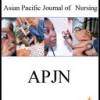Volume 12, Issue 1, 2025

Mcmed International
Asian Pacific Journal of Nursing
Issn
XXX-XXXX (Print),
2349 – 0683 (Online)
Frequency
bi-annual
Email
editorapjn@mcmed.us












